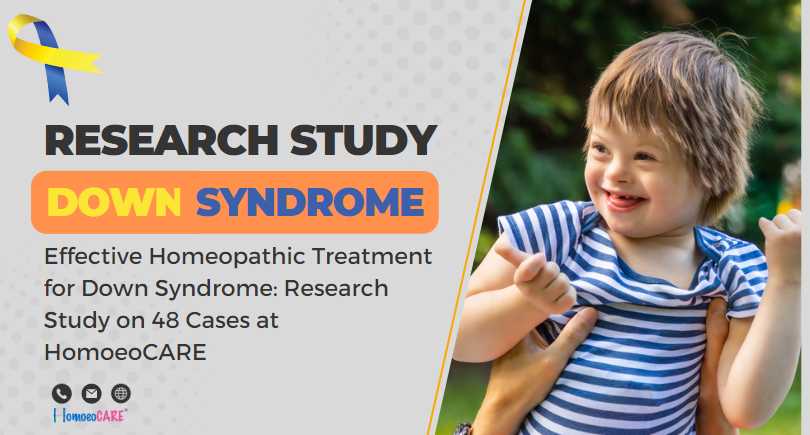What is Down Syndrome?
Down syndrome, a genetic disorder characterized by an extra copy of chromosome 21, does not have a permanent cure.
However, homeopathy has shown remarkable potential in effectively managing and alleviating many additional symptoms associated with Down syndrome. This research article presents a study conducted at HomoeoCARE, where 48 cases of Down syndrome were examined to determine the effectiveness of homeopathic treatment. The objective is to provide hope and guidance to parents of children with Down syndrome, showcasing the possibilities for their child’s independence and overall well-being through homeopathy.
Types of Down Syndrome
Down syndrome can be categorized into three main types: trisomy, mosaic, and translocation.
Trisomy 21
Trisomy 21, which occurs in approximately 95% of cases, is characterized by every cell in the body having three copies of chromosome 21.
Translocation Down syndrome
Translocation Down Syndrome, a less common variation, involves a genetic component and can be inherited from a parent with a balanced translocation.
Mosaic Down syndrome
Mosaic Down Syndrome, found in 4-5% of cases, occurs when only some cells have an extra copy of chromosome 21.
The effectiveness of homeopathic treatment varies based on the specific type of Down syndrome.
Research Study and Findings of Down Syndrome
HomoeoCARE conducted an extensive research study involving 48 cases of Down syndrome to evaluate the effectiveness of homeopathic treatment for down syndrome. The study yielded insightful findings that provide a deeper understanding of the potential benefits of homeopathy for children with Down syndrome.
- Trisomy 21
In cases of trisomy 21, the most prevalent form of Down syndrome, homeopathic treatment showed varying results. The outcome heavily relied on the expertise of the homeopathic physician in identifying the underlying cause of Down syndrome and gathering information about the mother’s physical and mental stress during pregnancy. - Translocation Down syndrome
Translocation Down syndrome, which accounts for a smaller percentage of cases, involves a genetic component that can be inherited from a parent. Identifying which parent transferred the translocation is crucial, as the parent’s history, nature, and constitution play a significant role in achieving positive results with homeopathic treatment. - Mosaic Down syndrome
The mosaic variety of Down syndrome, found in approximately 4-5% of cases, showed promising outcomes with homeopathic medicines. As this variation involves only some cells having an extra copy of chromosome 21, homeopathy exhibited a positive effect in managing symptoms for individuals with mosaic Down syndrome.
Addressing Concerns and Providing Hope for Down Syndrome
Receiving a diagnosis of Down syndrome can be emotionally challenging for parents, evoking anxiety, fear, and grief. However, accepting the reality and exploring avenues to support their child’s development is essential. Homeopathy offers a ray of hope by playing a significant role in improving physical and mental growth, enabling children with Down syndrome to achieve independence in their day-to-day activities.
Mental Retardation
One of the common concerns for parents is mental retardation. Homeopathic treatment, complemented by proper educational support, has shown promising results in improving the IQ of children with Down syndrome by 25-50%. This improvement empowers them to enhance their cognitive abilities and reach their full potential.
Lowered Immunity
Children with Down syndrome often have compromised immune systems, making them more susceptible to infections. Homeopathic medicines have proven effective in enhancing their immunity, significantly reducing the frequency and severity of infections. This improvement has resulted in a decreased reliance on antibiotics, promoting better overall health.
Delayed Milestones
Delayed milestones, such as motor development, can hinder a child’s progress. However, homeopathy, when combined with occupational therapy, has yielded positive results in helping children with Down syndrome achieve milestones within an appropriate timeframe. This integrated approach supports their physical development and enhances their overall quality of life.
Gastric complaints
Gastric complaints are another common concern among children with Down syndrome, including issues like gastroesophageal reflux (GERD), constipation, intestinal blockages, celiac disease, and food sensitivities/allergies. Homeopathy has proven highly effective in addressing these concerns, providing relief from symptoms, and improving overall digestive health.
Conclusion
While Down syndrome remains a genetic disorder without a cure, the research study conducted at HomoeoCARE on 48 patients demonstrates the effectiveness of homeopathy in managing the additional symptoms associated with Down syndrome. By leveraging homeopathic treatment, parents can provide their children with a holistic approach to address mental retardation, lowered immunity, delayed milestones, and gastric complaints. Homeopathy, in combination with appropriate educational support, helps children with Down syndrome achieve their maximum potential, fostering their independence and overall well-being. For the best homeopathic treatment for your child with Down syndrome, HomoeoCARE offers expertise and hope, empowering parents on their journey toward optimizing their child’s health and development.
To know the exact cause of down Syndrome, click here to read the blog

